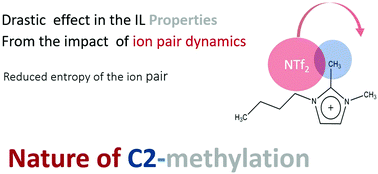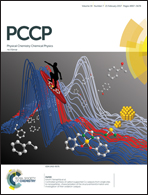Nature of the C2-methylation effect on the properties of imidazolium ionic liquids†
Abstract
Methylation at the C2 position of 1,3-disubstituted imidazolium-based ionic liquids (ILs) is one of the structural features that has gained attention due to its drastic impact on thermophysical and transport properties. Several hypotheses have been proposed to explain this effect but there is still much discrepancy. Aiming for the rationalization of the effects of these structural features on the properties of imidazolium ILs, we present a thermodynamic and computational study of two methylated ILs at the C2 position of imidazolium, [1C42C13C1im][NTf2] and [1C32C13C1im][NTf2]. The phase behaviour (glass transition and vaporization equilibrium) and computational studies of the anion rotation around the cation and ion pair interaction energies for both ILs were explored. The results have shown that C2-methylation has no impact on the enthalpy of vaporization. However, it decreases the entropy of vaporization, which is a consequence of the change in the ion pair dynamics that affects both the liquid and gas phases. In addition, the more hindered dynamics of the ion pair are also reflected in the increase in the glass transition temperature, Tg. The entropic contribution of anion-around-cation rotation in the imidazolium [NTf2] ILs was quantified experimentally by the comparative analysis of the entropy of vaporization, and computationally by the calculation of the entropies of hindered internal rotation. The global results exclude the existence of significant H-bonding in the C2-protonated (non-methylated) ILs and explain the C2-methylation effect in terms of reduced entropy of the ion pair in the liquid and gas phases. In light of these results, the C2-methylation effect is intrinsically entropic and originates from the more hindered anion-around-cation rotation as a consequence of the substitution of the –H with a bulkier –CH3 group.



 Please wait while we load your content...
Please wait while we load your content...